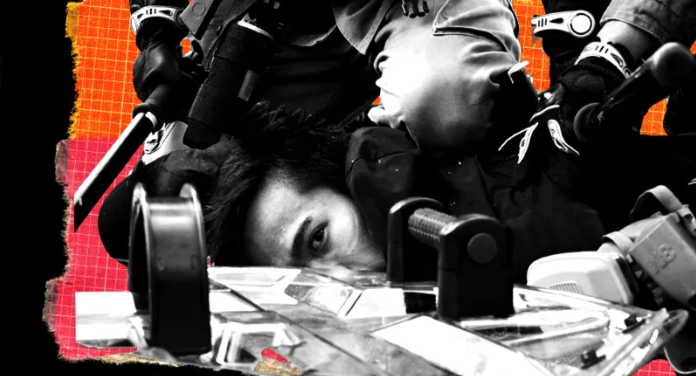The ten years of protest in Hong Kong have been silenced and erased, leaving behind a rebellious legacy.
The memories began rushing back as Kenneth strolled through Hong Kong’s Victoria Park, once a focal point for the city’s resistance to China.
As a child, Kenneth would buy calligraphy posters from pro-democracy politicians at the annual Lunar New Year fair.
Then there were the protest marches he joined as a teenager, that would always start here before winding their way through the city. When he was just 12, he began attending the park’s massive vigils for the Tiananmen massacre – a taboo in mainland China, but commemorated openly in Hong Kong.
Those vigils have ended now. The politicians’ stalls at the fair are gone, protests have been silenced and pro-democracy campaigners jailed. Kenneth feels his political coming-of-age – and Hong Kong’s – is being erased.
“People still carry on with life… but you can feel the change bit by bit,” said the former activist, who did not want to reveal his real name when he spoke to us.
“Our city’s character is disappearing.”
On the surface Hong Kong appears to be the same, its packed trams still rumbling down bustling streets, its vibrant neon-lit chaos undimmed.
But look closer and there are signs the city has changed – from the skyscrapers lighting up every night with exultations of China, the motherland, to the chatter of mainland Mandarin increasingly heard alongside Hong Kong’s native Cantonese.
It’s impossible to know how many of Hong Kong’s more than seven million people welcome Beijing’s grip. But hundreds of thousands have taken part in protests in the past decade since a pro-democracy movement erupted in 2014.
Not everyone supported it, but few would contest that Beijing crushed it. As a turbulent decade draws to a close, hopes for a freer Hong Kong have withered.
China says it has steadied a volatile city. Hundreds have been jailed under a sweeping national security law (NSL), which also drove thousands of disillusioned and wary Hongkongers abroad, including activists who feared or fled arrest. Others, like Kenneth, have stayed and keep a low profile.
But in many of them lives the memory of a freer Hong Kong – a place they are fighting to remember in defiance of Beijing’s remaking of their city.
When Hong Kong, a former British colony, was returned to China in 1997, it was under the assurance that the city would keep some rights, including free speech, freedom of assembly and rule of law for 50 years. But as Beijing’s power grew, so did the disquiet within the city’s pro-democracy camp.
In September 2014, tens of thousands of protesters began to stage mass sit-ins in downtown Hong Kong, demanding fully democratic elections. It propelled a new generation of pro-democracy campaigners to prominence – such as Joshua Wong, then a 17-year-old student, and Benny Tai, a college professor, who called the movement Occupy Central.
It also seeded the ground for more explosive protests in 2019, which were triggered by Beijing’s proposal to extradite locals to the mainland. The plan was scrapped but the protests intensified over several months as calls grew for more democracy, becoming the most serious challenge to Beijing’s authority in Hong Kong.
“Without Benny Tai, there would have been no Occupy Central,” says Chan Kin-man, who co-founded the campaign with Tai and Reverend Chu Yiu-ming.
“He had the temper of scholars and spoke his mind… that’s why he was bold enough to push for changes and think about big ideas. It is always people [like this] who change history.”
Chan and Rev Chu are both exiles in Taiwan now. Chan moved to Taipei in 2021, after serving 11 months in jail for inciting public nuisance in his role in Occupy Central. He is now a fellow at a local research institute.
Tai is still in Hong Kong, where he will spend the next decade behind bars.
In November, he was sentenced to jail for subversion, along with more than 40 other pro-democracy campaigners including Wong, many of whom have been in jail since their arrest in early 2021. As Wong left the courtroom, he shouted: “I love Hong Kong.”
The following day 76-year-old billionaire Jimmy Lai, a fierce critic of China, testified at his trial for allegedly colluding with foreign forces. Frail but defiant, he told the court his now-defunct newspaper Apple Daily had only espoused the values of Hong Kong’s people: “Pursuit of democracy and freedom of speech”.
The trials have passed quietly, in stark contrast to the events that led to them. Small signs of protest outside the court were quickly shut down – a woman sobbing about her son’s sentence was taken away by police.
Beijing defends the restrictions – including the NSL under which the trials are happening – as essential for stability. It says the West or its allies have no right to question its laws or how it applies them.
But critics accuse China of reneging on the deal it struck in 1997. They say it has weakened the city’s courts and muzzled the once resounding cry for democracy in Hong Kong.













